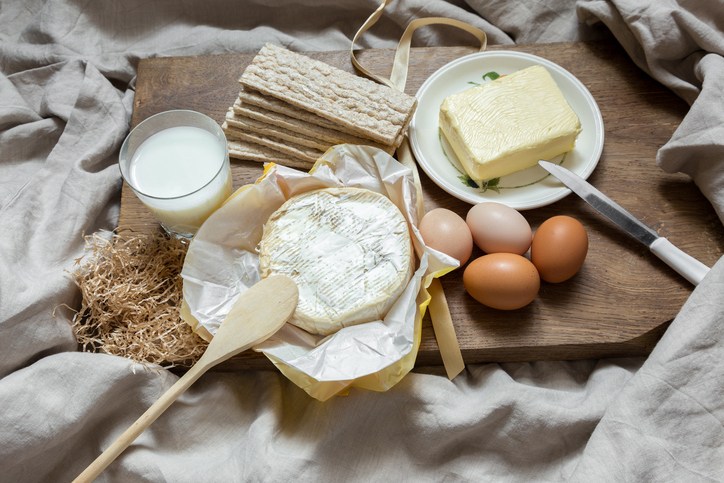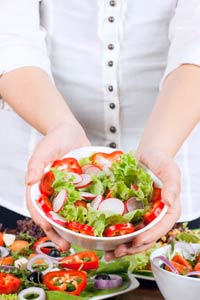Still Counting Calories? Think Again
At one time or another, we've all been promised this: "If the amount of calories we eat is less than the amount of calories our bodies use, we will lose weight." I'm sorry to say that this promise is false.
Women come to my door every day frustrated and confused about why the concept of calories in, calories out just doesn't work for their weight loss efforts. They've tried everything to lose weight and have been made to feel worse when nothing works. The first thing I say to these women is that, "Your instincts are right. Calories are not all created equally and they cannot always simply be burned off with the right amount of exercise."
On the surface, it makes sense that we would lose weight if we simply ate fewer calories than we burned, but as my colleague, celebrity nutrition and fitness expert, JJ Virgin, says, "Our bodies are chemistry labs, not bank accounts." Food is digested and used uniquely in each of us -- depending on our ages, our genetics, our lifestyles, our food sensitivities, ability to detoxify, and on and on and on. There are endless factors in how our calories are used and the messages those calories send to our bodies. This means that a calorie is not just a calorie. Every calorie we eat will be utilized uniquely in each of us.
My Struggle With Calories
Ever since I moved to America from Australia, I'd struggled with my weight. There were days when I simply wouldn't eat anything except for one meal. I joined Weight Watchers at age 19 and was so motivated to lose weight that I never cheated. I weighed and measured every morsel of food as I was told, but when it came time to step on the scale, I'd lose only half a pound or sometimes even gain weight.
My struggle continued for years until I discovered that I was sensitive to gluten. Once I removed gluten from my diet and fed my body whole, fresh foods, it was amazing how quickly my body dropped weight and rebalanced itself. For years, every time I ate a piece of bread, a bagel, or a bite of pasta, I'd triggered a cascade of events in my immune system, putting my body on high-alert and causing it to hang on to extra pounds. So for me, the calories in foods that contained gluten were causing more trouble than they were worth to my body.
200 Calories Isn't Just 200 Calories
Food is information for our bodies. Before we even address food sensitivities, 200 calories of sugar or hydrogenated oils (think doughnuts) sends different messages to our genes than 200 calories of spinach and olive oil might. And this is true for all of us. The nutrients in fruits and vegetables (we call them "phytonutrients") can work with our cell-signaling pathways and actually influence our genetics. Phytonutrients can help to turn on detoxifying enzymes, help destroy cells that have gone down the wrong path (i.e. precancerous cells), and also have anti-inflammatory effects. [1] The fiber in fruits and vegetables can also directly help with weight loss. [2]
If there is a certain food you are sensitive to like I was to gluten, it can make the calories in, calories out argument even more complicated. If you are sensitive to a food and consume it, the calories will likely be used differently than if you weren't sensitive to the food. When we consume foods we're sensitive to, our bodies have to expend energy to process the "toxin" and if the food is part of your regular diet, this "toxin" is building up in your body on a daily basis.
This is why it's so important to listen to your body when it comes to the calories you consume. What kinds of foods make you feel good? And which don't? In general, I suggest filling your plate with colorful fruits and vegetables, healthy fats and lean protein. These are the calories that will most likely be best for your genes and your jeans.
Common Problem Foods
There are several common foods that cause sensitivities in the body and that I see keeping women (and men) from weight loss. And if you are suspicious that a food sensitivity may be getting in the way of your weight loss efforts, try an elimination diet. Remove the most common problem foods:
- Gluten
- Dairy
- Eggs
- Yeast
- Peanuts
- Citrus
Stay off of these foods for a period of at least three weeks and see if you notice a difference. Once three weeks have passed, introduce one food group at a time and see what happens. You may find that calories you thought were healthy (like an orange or a handful of nuts) may be setting off an alarm system in your body that will "protect" you by packing on extra pounds.
When my son was 12 years old, I realized he had a sensitivity to dairy. After just two weeks without dairy in his diet, he lost 15 pounds and literally looked like a different kid on the soccer field. All of the puffiness surrounding his body was gone and he was able to run like I hadn't seen in years.
Find Out If You Are Weight Loss Resistant
If you've tried everything -- cutting calories, exercising more, jumping from one fad diet to the next, and still haven't lost weight, you may have weight loss resistance. This means that there is an imbalance in your body keeping you from losing weight, and until that imbalance is addressed, you'll likely continue struggling to lose weight.
There are many imbalances that can lead to weight loss resistance, including food sensitivities like my son and I had. Some of the other imbalances include: hormonal (including thyroid), adrenal, neurotransmitter, systemic inflammation, and impaired detoxification pathways. My next blog post will be dedicated to the concept of weight loss resistance and what you can do about it, so stay tuned. But if you'd like to read more now, see my article, "Do You Have Weight Loss Resistance?"
If you remember one thing from this blog, let it be that food is information. Give it the good stuff and your body will thank you, your clothes will fit better and you can say goodbye to counting calories.
References:
[1] Pan, M., & Ho, C. 2008. Chemopreventive effects of natural dietary compounds on cancer development. Chem. Soc. Rev., 37 (11), 2558-2574. URL (abstract): http://www.ncbi.nlm.nih.gov/pubmed/18949126 (accessed 03.03.2009).
Heber, D. 2004. Vegetables, fruits and phytoestrogens in the prevention of diseases. J. Postgrad. Med., 50 (2),145-149. URL (abstract): http://www.ncbi.nlm.nih.gov/pubmed/15235216 (accessed 03.03.2009).
[2] Bes-Rastrollo, M., et al. 2006. Association of fiber intake and fruit/vegetable consumption with weight gain in a Mediterranean population. Nutrition, 22 (5), 504-511. URL (abstract): http://www.ncbi.nlm.nih.gov/pubmed/16500082 (accessed 03.03.2009).
Liu, S., et al. 2003. Relation between changes in intakes of dietary fiber and grain products and changes in weight and development of obesity among middle-aged women. Am. J. Clin. Nutr., 78 (5), 920-927. URL: http://www.ajcn.org/cgi/content/full/78/5/920 (accessed 03.03.2009).
For more by Marcelle Pick, OB-GYN N.P., click here.
For more on diet and nutrition, click here.
For more on weight loss, click here.
-
Best Program For Extreme Weight Loss (Motivation Tips The Shocking Truth)
Best Program For Extreme Weight Loss (Di
-
How Much Exercise Do You Need To Lose Weight?
One question that keeps coming up is… how much exercise are we s
-
Weight Loss Supplements
Weight loss programs may be quite tiresome and time consuming for a l
-
How to lose at least 5 pounds of fat a week.
If you want to lose weight quick you need to have a great diet regi
-
The Best Multi Vitamin Benefits
No matter what your fitness or weight loss goals may be, there is o
-
Can Weight Loss Help Ease Knee Pain?
There is currently no cu
- DON'T MISS
- Good Carbs, Bad Carbs: Using Fiber to Drive Weight Loss
- One Of The Best Ways To Lose Weight Is To Eat Food With Low Calories
- The Missing Key That Will Turn Your Boring Exercise Routine Into A Dynamite Fat Burning Session
- Home Exercise Programs Designed For Weight Loss
- 25 weight loss tips
- Close Kept Secrets To Weight Loss Lesson 28
- 3 Mistakes People Make When Theyre Trying To Get Healthy
- Get The Body You Deserve With These Easy To Follow Weight Loss Guidelines!
- Celiac disease: Symptoms and remedies
- The Secret To Losing Weight - Shed The Pounds By Burning The Fat And Eating Healthier




